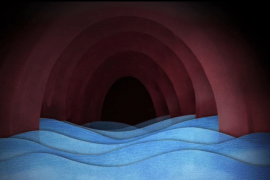Okla Elliott
It wasn’t a kidnapping at all, or not a real one, not like the ones you see in the movies with abandoned houses and rickety wooden chairs and duct tape. But Tanner’s mother insisted on calling it that, and the district attorney insisted on calling it that, and that was the verdict of the judge despite what Tanner tried to say about what had happened that almost perfect day in October.
Tanner was twelve years old then, and his parents had been divorced for three years. He knew his father was what people called a bad father and a bad husband. He drank, missed school sporting events, even once threw part of a concrete birdbath through the living room window when Tanner’s mother had locked him out of the house. That was just before she divorced him. And Tanner understood why she would divorce him. He had been told dozens of times by friends of the family, his grandparents—both his mother’s parents and his father’s—that his father was bad for the family. No one listened to his father’s apologies anymore and everyone listened to his mother’s complaints. The listening people of the world were all on her side, so Tanner decided to be on his father’s. He had never liked school sporting events either and would have missed them if he could. And how often had he wanted to break windows, puncture tires, set the whole ugly world on fire?
So when his father arrived at school to pick him up—standing in front of his car, looking nervous and sad—even though Tanner’s mother had told him not to go anywhere with his father and to call her immediately if his father contacted him, Tanner ran to his father and hugged him, made a big public show of how much he loved his father, which he did. He looked up and saw the nervousness and sadness replaced with happiness and salvation, or what Tanner assumed the pastor meant when he spoke of salvation of sinners.
“How you doing, Big Man?”
“Pretty good, I guess. School sucks.”
“Don’t say that,” his father said. “You have to do well in school. Your grades are still good, right?”
“Yeah. I’m doing good. Especially in geography class. Mrs. Phelps is the best teacher, and I like looking at the maps. But everything else is so stupid.”
“It can seem that way sometimes, I know, but keep playing like it isn’t and just do what you’re supposed to.”
Tanner was tired of talking about school and was getting worried that his mother had warned the school about his father.
“Where are we going?”
“Anywhere you want to go, Big Man. Anywhere in the whole fucking world.”
They drove to a McDonald’s for food. Tanner didn’t really want to go to McDonald’s, though he liked their French fries, and it was the first place he could think to tell his father he wanted to go. As they talked, his father suggested they go get him a map to put up on his bedroom wall. They went to Wal-Mart and looked in the school supplies section and found a nice colored map of the world. Tanner loved it, every little thing about it. His father bought the map and handed him the bag with the map neatly rolled in it. Tanner put it in his book bag so his mother wouldn’t know what he had. It was time to get Tanner home, his father said.
As they drove, Tanner asked, “Father, why are you like you are?”
“You know, it’s always cracked me up the way you call me that. Other kids call their dads Dad, but not you.”
“I just like it better. Sounds more important. But I’m kind of strange. All the kids think so, I can tell, and so does Nathan. I hate him.”
“Well, I can’t say he’s my favorite man, but you shouldn’t hate anyone. That’s how I got to be the way I am.”
The sun had set and they drove the rest of the way in the dark listening to news on the radio. When his father still lived at home, Tanner would sit with him and watch the news. It made him feel adult and made him feel closer to his father. Even now, years after the kidnapping, years after the other tragedies, Tanner still remembers those evenings with his father, and this car ride with him, taking in the news of the world.
When they got to the house, the police were already there. His mother had warned the school officials, as Tanner had worried, and they had called the police. They arrested his father as his mother grabbed Tanner and hugged him and kissed him, asked him if he was okay, making a big show of how much she loved him, which she did. Tanner kept saying, “But he didn’t hurt me. He didn’t do anything.” But no one listened to him; his mother, as was her art, had all the listeners. The blue and red of the police lights were alternately muted in the porch-light glow that made a semicircle in the front lawn. After the police were gone, Tanner went into his room and put the map up on his wall with thumbtacks. He didn’t tell his mother about the map and enjoyed not telling her.
That night, Tanner overheard his mother talking with Nathan.
“This is going to ruin his life,” Nathan said. “He might even go to jail.”
“He should have thought of that.”
“He’s such a sad case.”
“Well, not everyone’s life is meant to be happy.”
Tanner lay in bed thinking of that idea. Are there people meant to be unhappy? Is anyone meant to be happy, or is it always an accident? He rolled over onto his side and breathed the warm smell of his clean sheets and wondered what kind of person he was—meant for happiness, either by design or accident, or meant for sadness. Then he decided it was a stupid question since there was no answer, so he closed his eyes and named country names until he went to sleep, the whole while imagining that his father could hear him naming the countries, and so he picked ones he thought his father would like best. Uruguay, Brazil, Holland, Italy . . .
Okla Elliott’s work has appeared or is forthcoming in Another Chicago Magazine, Indiana Review, International Poetry Review, The Literary Review, Natural Bridge, New Letters, North Dakota Quarterly, A Public Space, and The Southeast Review, among others. He is the author of a full-length collection of short fiction, From the Crooked Timber (forthcoming 2011), three poetry chapbooks—The Mutable Wheel; Lucid Bodies and Other Poems; and A Vulgar Geography—and he co-edited (with Kyle Minor) The Other Chekhov.


